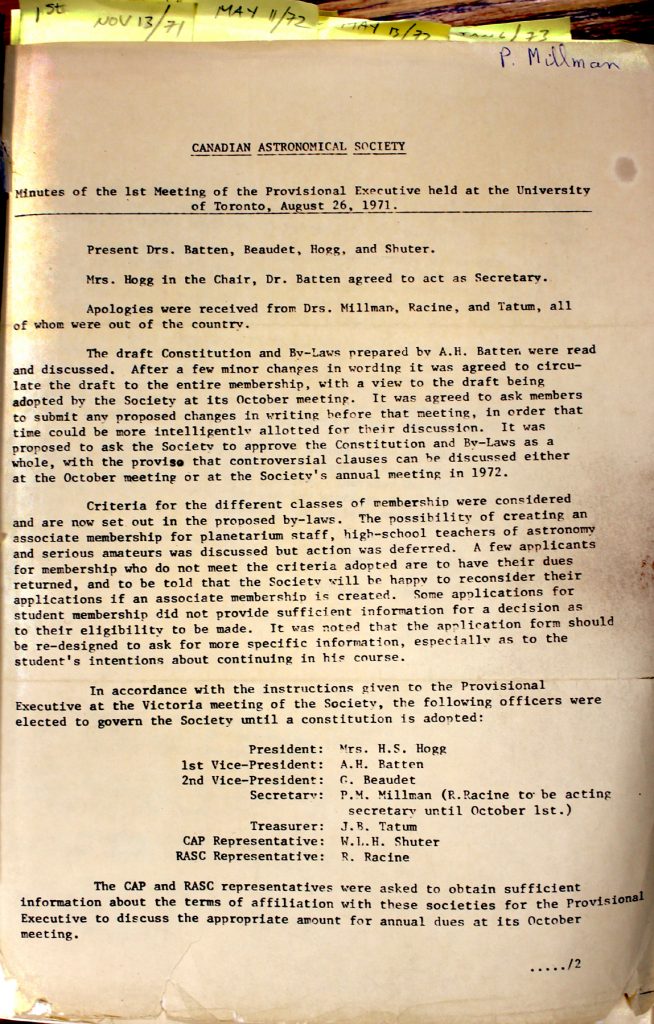By / par Rob Thacker (CASCA President)
(Cassiopeia – Spring / printemps 2020)
Dear CASCA Members,
The past three months have been unprecedented in our lifetimes. We’re seeing the impact of COVID-19 across all levels of our lives, be they personal, professional, community, and beyond. The academy has been comparatively quick to act to transition to online services, but adjustments to our operations will continue to have to be made.
While many observatories are understandably having to suspend operations, organizationally, CASCA can function in an – almost – entirely electronically-mediated fashion. There is one exception, the Business Meeting, but we have a strategy to handle the bylaw expressly forbidding all-electronic meetings that will still allow significant online participation. We can’t take this bylaw lightly either as we are a legal corporation. However, one of the first pieces of business in the annual Business Meeting will be a bylaw update for exceptional circumstances.
Coalition Update
It’s been a comparatively quiet period for the Coalition, largely down to TMT discussions and updates to government now being handled by the NRC. The Coalition has been in direct contact with the Department of Innovation, Science and Economic Development and we’ve been assured they are receiving frequent updates. Of course, many of you will have heard that the cost estimate for the project has now risen to $2.4B, while most of us appreciated this increase was inevitable the number is now public. CATAC has remained very active as you will see from their update to the community in this issue of Cassiopeia.
At the same time the SKA has moved forward notably, and the decision on the precise construction configuration is made. As hoped, no further descoping of the project is under consideration. This does mean a moderate increase in the project cost but since it has been decided before a precise ask for funds it can be handled. Canada’s proposed contribution remains around the 6% level, consistent with prior discussions of participation levels.
Where things get yet further uncertain is the release of the LRP and what will happen within the context of an economic stimulus package. Anyone doing research on the impact of the 1918/19 influenza pandemic will know that, by and large, economies recovered well. However, the precise factors involved in that recovery are debated, for example, the pandemic came shortly after a war and there was already a shortage of labour.
I hate to state the obvious, but the LRP will be released in a truly unprecedented era.
AGM
The in-person cancellation was a difficult but obviously necessary decision. While there is some expectation of an easing of restrictions on a 6-8-week timescale, we can still expect limitations on large gatherings for some time yet.
Many of you are no doubt wrestling with moving the last few days of class online so we can complete the current semester. As was already noted in the exploder email that I sent out, we have moved to form an “Online Organization Committee” or OOC (I’m pronouncing it “ook” like “look”). I’d hoped to be able to list all the members in this communique, but we’re still trying to pin down the last couple of people. Expect to hear more on this in the next few days.
I’ve had a couple of emails wondering why the planned online AGM is focused on contributed posters rather than contributed talks. In all honesty that’s down to what our organization can handle at this time. We’re already pulling in best-practice information, being in contact with the AAS, but starting with a plan that is “contained” allows us to build effectively.
The Future of CASCA
While my heart wants to talk about galaxy formation, my head is telling me that if I’m going to say anything in President’s Address I ought to talk about the future of CASCA. In addition to my Associate Dean/Outreach duties at SMU I’m also the Chief Negotiator for our faculty union. That has some interesting advantages in that I get access to some detailed organizational discussions, specifically the service vs mobilization approach to governing associations. Frustratingly, I wish I had known these things at the beginning of my Presidency. It would have been good to action a few of the concepts, but for now I’ll just say I think there are some good ideas we can utilize to make CASCA increasingly valuable and effective for our community. Tune in to the AGM for more.
So long
With my President’s term finishing at the Business Meeting in May, this marks my last Cassiopeia report! It’s been my sincere honour to serve in this role and to represent a community, that despite differences, is capable of open and frank discussions. I’ve learned a lot from many of you in my term as President, and I’m truly appreciative of that. Equally importantly, I again must thank all of you for volunteering your time, and for our staff their efforts, in support of CASCA and the wider aspirations of our community. CASCA simply doesn’t move forward without you!
With Sara Ellison stepping in the President’s office I know CASCA is headed on an even higher trajectory! Additionally, we’re writing up macro-schedules for officers, so each Board transition is hopefully getting just that bit easier. But it is a time of enormous upheaval as well, so I ask you all to be understanding and give Sara the support she’ll need during this transition period.
As we all face the threat of COVID-19 together, we need to support each other. I hope that you can find your own personal way to deal with the stresses this has brought, and to find a way to help others in your life.
I wish you all good health and, as much as can be expected, clarity of thought.
Take care everyone,
Rob



















